Head and Neck cancer Patient Educational Resources
Oral Cancer specialist in Delhi NCR | Cancer of the head and neck, oral cavity, buccal mucosa, tongue, larynx, nasopharynx – Squamous cell carcinoma of the head and neck specialist in Delhi. Dr Vineet Govinda Gupta, Medical Oncologist in Delhi, Gold Medalist AIIMS (New Delhi) formerly for more than 12 years. भारत दिल्ली में मुंह गले जीभ के कैंसर का पक्का इलाज. Access ethical, reliable and world class cancer care in Delhi NCR, Gurgaon, Faridabad, Noida, Ghaziabad. More information here.
Call/Whatsapp: +919013812875
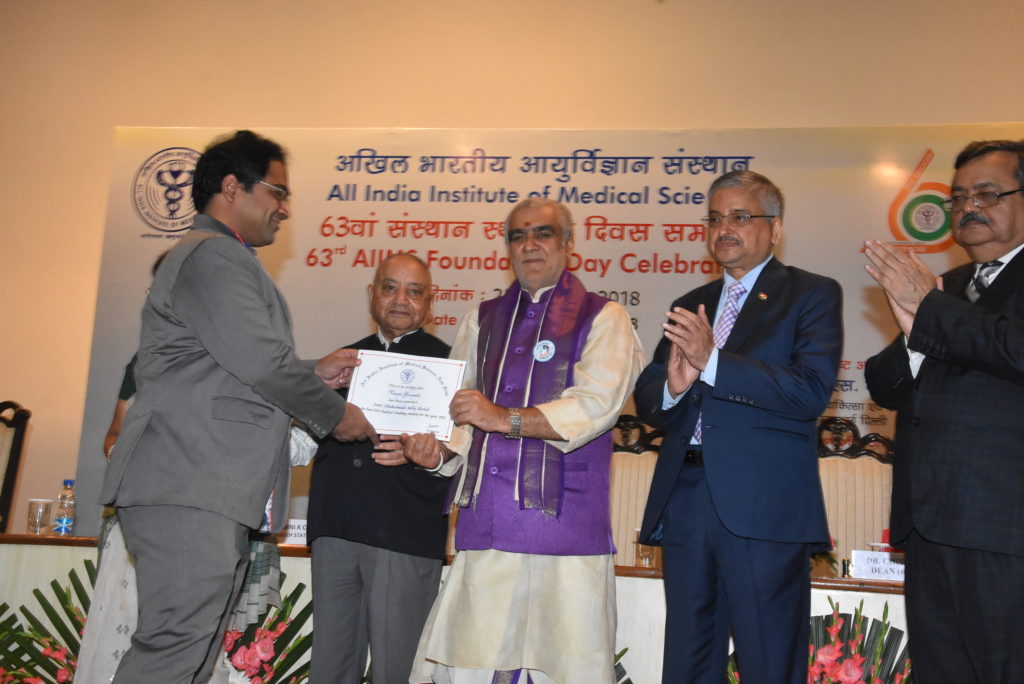
Receiving the Gold Medal for best Medical Oncologist AIIMS New Delhi
What is meant by head and neck cancer?
Cancer is a condition where the normal cells of the body become abnormal and start growing and multiplying uncontrollably and gain the ability to spread throughout the body. Head and neck cancer refers to cancer arising in the head or neck area of the body. There are many types of head and neck cancer (subsites). Each of them is treated a little differently but they all have overall similar characteristics.
What are the different types of head and neck cancer?
There are many different types of head and neck cancer, depending upon the site of origin. These are called “subsites” of head and neck cancer. Each of them is treated a little differently. Key subsites include:
- Oral cavity cancer
- Lip cancer
- Tongue cancer
- Floor of mouth (FoM) cancer
- Buccal Mucosa (BM) cancer
- Gingivobuccal sulcus (GBS)
- Superior alveolar ridge
- Inferior alveolar ridge
- Hard Palate cancer
- Soft Palate cancer
- Retromolar trigone (RMT) cancer
- Base of tongue (BoT)
- Tonsillar cancer
- Nasopharyngeal cancer (NPC)
- Pharyngeal cancer
- Laryngeal cancer
- Glottic cancer
- Supraglottic cancer
- Pyriform sinus (PFS)
What is meant by “squamous cell carcinoma”?
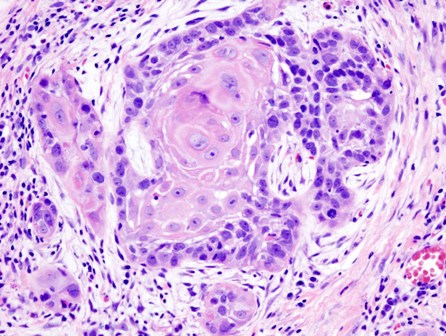
Biopsy appearance of squamous cell carcinoma
Squamous cell carcinoma refers to the biopsy appearance of cancer of the head and neck. The majority of cancers in the head and neck area are squamous cell carcinomas.
Are there other types of cancer besides squamous cell carcinoma?
Around 10% of cancers of the head and neck are non-squamous. The treatment of these cancers differs in significant ways from squamous cell carcinoma. Examples include neuroendocrine tumors and small cell carcinomas, salivary gland cancers, sarcomas, mucoepidermoid carcinoma, sinonasal undifferentiated carcinoma (SNUC) etc
Expert opinion is strongly recommended for these rare cancers.
Obtain an e-consultation regarding treatment of different histologies
What are the causes of head and neck cancer?

Tobacco causes cancer
- Tobacco use, as khaini, gutkha, pan masala, supari or smoking are the most important cause of head and neck cancer
- Some virus infections, most importantly HPV and EBV
- Rarely, some patients may have a familial predisposition
Learn more about the causes of cancer
What is HPV? How is HPV-related cancer different from tobacco-related cancer?
HPV stands for human papillomavirus. This is a virus which is commonly implicated in causing warts and cervical cancer. This virus can spread from person via orogenital contact or unusually by kissing.
Some features of HPV-related cancer include:
- Tendency towards oropharyngeal and tonsillar location
- Better prognosis than tobacco-related cancers
- Some differences in staging and treatment
Learn more about HPV-related head and neck cancer
Can head and neck cancer spread from person to person?
Head and neck cancers are not contagious and cannot spread from person to person.
My family member developed oral cancer, am I also at risk?
Some rare cases are associated with a familial predisposition. However, the vast majority have no inherited component.
What are the common symptoms of head and neck cancer?
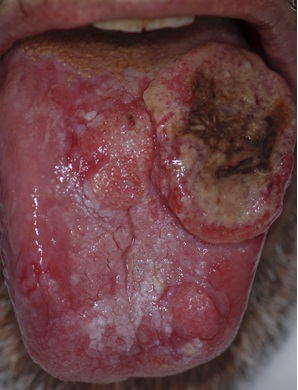
A mass or ulcer is a common symptom of tongue cancer
The exact symptoms depend upon the site of involvement. However, some common symptoms include:
- An ulcer which does not heal
- Difficulty in opening the mouth (trismus)
- A mass or swelling
- Bleeding from the mouth, nose or on coughing
- Masses or lumps appearing in the neck
- Stuffiness or blockage of the nose that does not improve
- Change in voice
- Difficulty in swallowing or breathing
How is head and neck cancer diagnosed?
The diagnosis of cancer is dependent upon a biopsy. In a biopsy, a small amount of cancer tissue is removed and checked under a microscope. A biopsy can be done by direct removal from a visible lesion, from an accessible lymph node, or by an endoscope.
Does a biopsy cause spread of cancer? Is it risky?
In general, a biopsy does not cause spread of cancer and is not considered risky. Biopsy from some areas (like neck nodes) need to be considered carefully, thus expert consultation is recommended before biopsy in suspected cancer.
Guidance about biopsy – send us a free e-consult
I have been diagnosed with cancer of the head/neck area. What tests will I have to undergo?
The exact test varies from person to person, however, some common tests include:
- Blood tests
- CT or MRI scan of the local area, neck, and sometimes the chest
- Whole body PET-CT scan (not routine for all patients)
- Endoscopies (Laryngoscopy, pharyngoscopy, etc)
- Additional tests for specific patients as needed
What is a multi-disciplinary team (MDT)? Is it compulsory for treating head and neck cancer?
A multi-disciplinary team is a team of multiple cancer specialists who together discuss each case and decide the appropriate line of treatment. Treatment of head and neck cancer is highly complex and requires sophisticated decision-making with inputs from multiple specialists. Thus, a MDT is usually a routine part of treatment of this cancer, with some exceptions.
Typical members of MDT include:
- Surgeon
- Medical Oncologist
- Radiation Oncologist
What is meant by “lymph nodal metastases”? Why is it important?
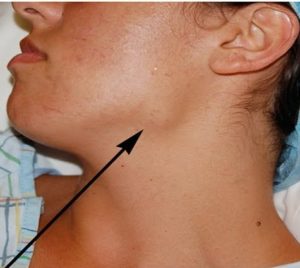
Head and neck cancers can spread to lymph nodes in the neck
Typically, cancer of the head and neck spreads first of all to the lymph nodes in the neck. These are called “lymph nodal metastases”. These are important because:
- These nodes have to be treated to cure the cancer, in addition to the primary site of cancer
- The presence of cancer in lymph nodes makes it more likely that cancer has spread to faraway sites like lungs or bone
Guidance on treatment of head and neck cancer with lymph node metastases
How is head and neck cancer treated? Is it curable?
Head and neck cancer is curable. The treatment generally uses the following modalities, either alone or in combination:
- Surgery, to remove cancer from the body by operations
- Systemic therapy, to control and eliminate cancer in the body using chemotherapy, targeted therapy or immunotherapy
- Radiation therapy, which uses beams of high energy to “burn” and destroy cancer cells
An expert oncologist can help you navigate the complexity of treating your cancer.
Obtain a free e-consultation from an oral cancer specialist in Delhi
What is meant by neck dissection? Why is it important? Are there any alternatives?
Neck dissection is a surgery of the neck to look for and eliminate cancer-containing lymph nodes. Since lymph nodes are usually the first site of spread of cancer, removal of these nodes is required to achieve cure.
Sometimes, patients may not undergo neck dissection and instead be treated with radiotherapy, with or without chemotherapy. The exact therapy to use depends on your cancer and how it is being treated.
What is chemotherapy? Is it compulsory in every patient?

Chemotherapy, also known as cytotoxic therapy, refers to drugs that fight and kill cancer. Cancer generally means uncontrolled multiplication of cells in the body that have lost their normal ability to control their growth and spread. On the other hand, most of the normal cells in the body do not divide rapidly like cancer cells. Chemotherapy works by killing only those cells which are growing and dividing rapidly. This allows chemotherapy to kill cancer cells while not affecting most of the normal cells in the body.
Chemotherapy is not compulsory for every patient. A skilled oncologist can help you determine whether or not chemotherapy is right for you.
What is meant by neoadjuvant and adjuvant chemotherapy?
Neoadjuvant chemotherapy is chemotherapy given before curative surgery or radiation therapy. Neoadjuvant chemotherapy is usually given with the goal of reducing the cancer size or disease burden to make surgery easier, and to improve the long term cure rates.
Adjuvant chemotherapy is chemotherapy given after curative surgery or radiation therapy. Adjuvant chemotherapy is sometimes used to improve cure rates of cancer.
What is radiotherapy? Is it compulsory in every patient?
Radiotherapy is the use of invisible beams of high energy to kill cancer cells. Radiotherapy is frequently used in head and neck cancer and is one of the best treatments for it. However, radiotherapy is not compulsory in every patient. A skilled oncologist can guide you whether radiotherapy is right for you.
Get a free e-consultation regarding optimum radiotherapy use
What is meant by “concurrent chemoradiation”?
Concurrent chemoradiation (CCRT) is a treatment modality where chemotherapy and radiotherapy are given simultaneously. This is generally given to patients in one of two settings:
- Patients with cancers which cannot be removed completely by surgery
- Patients with cancers that have been removed completely, but have high-risk features that make them likely to return without further treatment
- Patients with cancers that recur after initial surgery
What is meant by palliative radiotherapy/palliative chemotherapy?
Palliative therapy is therapy which is given to improve symptoms and control disease to achieve a better quality and length of life for a patient who has advanced disease. Usually the treatment has a lower dose as compared to curative-intent therapy.
What is targeted therapy/cetuximab? Can it be used in head and neck cancer?
Cetuximab (Erbitux) is a targeted therapy. Targeted therapy is a new way of treating cancer that works by attacking specific molecular aspects present on cancer cells and absent on normal cells. Cetuximab works by attacking special proteins called “EGFR” present on the surface of cancer cells, thus cetuximab is also called an EGFR-inhibitor.
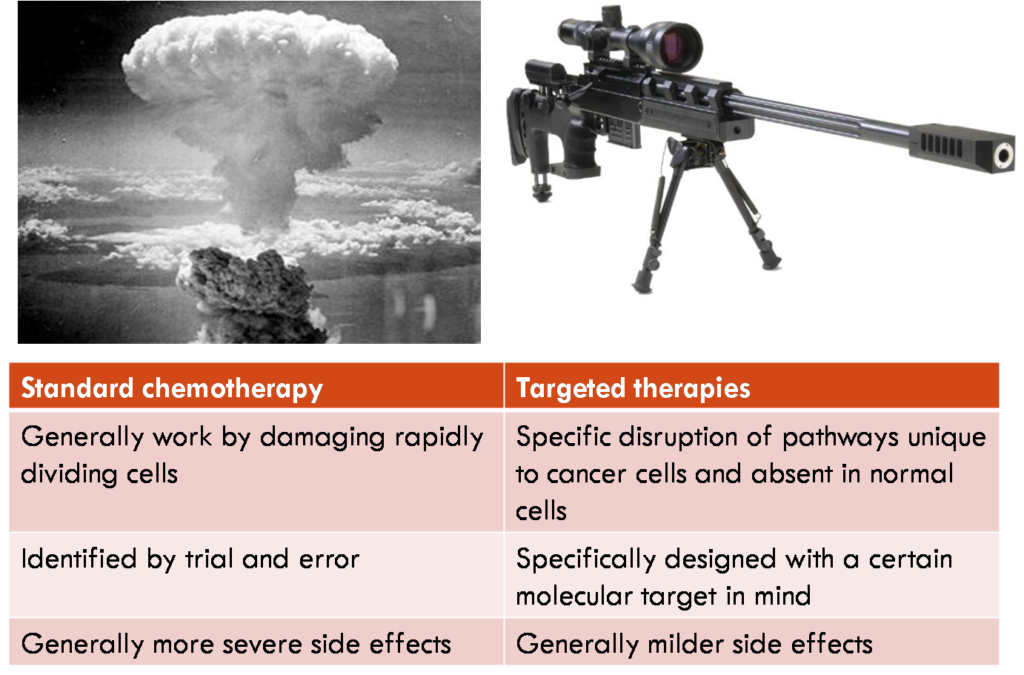
A comparison of Targeted therapy and chemotherapy
Cetuximab is very effective in the treatment of head and neck cancer, generally in the advanced setting (patients with inoperable or metastatc cancer).
More information about cetuximab
What is immunotherapy? Can it be used in head and neck cancer?

Immunotherapy is a new revolution in cancer
Cancer Immunotherapy refers to use of the body’s own immune system to fight cancer. Research has shown that the immune system plays a fundamental role in the control of cancer. The body’s immune system patrols the body for any cancer cells and kills them if it finds them. If the immune system fails in its duty, cancer develops. However, the ability of the immune system to fight cancer can be “boosted” using various technologies. This field of anticancer therapy is called “cancer immunotherapy”.
Head and neck cancer including mouth cancer and tongue cancer immunotherapy is readily available in Delhi India. In recent years, the field of head and neck cancer has shown the advent of several new drugs which have shown dramatic improvements in even difficult to treat cases. This is a rapidly evolving area of research.
Learn more about cancer immunotherapy
Watch a video introduction to cancer immunotherapy (hindi)
What is the prognosis of head and neck cancer?
Head and neck cancer is curable if detected and treated at an early stage. The precise prognosis depends upon the stage, histology, location and biology. With expert help, a large proportion of patients can be expected to achieve a permanent cure or prolonged disease control.
Why is it important to consult an oral cancer specialist in Delhi NCR?
Delhi is one of the best cities in India for treatment of cancer, with availability of skilled surgeons, radiation therapy and medical oncologists. Head and neck cancer is one of the most difficult and complex cancers to treat. Lack of proper treatment from the outset can lead to disease relapse, and the latter is often incurable. A skilled oncological team is needed to navigate the complexity. Further, in recent years there has been an influx of new drugs, technologies, targeted therapies and immunotherapy. Only a world-class team can deliver the best outcomes in this environment.
Dr Vineet Govinda Gupta is a medical oncologist based in Delhi NCR with expertise in the treatment of head and neck cancer. He is gold medalist from AIIMS New Delhi where he spent more than 12 years. He has received numerous awards and published research in cutting-edge journals. More information here
View my detailed curriculum vitae
I want to learn more about treatment options in head and neck cancer!
You can access more information using various sections of this website. Some common topics of interest are linked below. For other topics you can use the menu above or the search box. If you cannot find your topic of interest, you can send me a free E-consultation using the form below.
- Information about cancer
- Information about chemotherapy
- Information about targeted therapy
- Information about immunotherapy
Free E-consultation with an oral cancer specialist in Delhi
If you have additional questions not answered by the above section, use the form below to send me your queries and we will get back to you shortly. You can also Email me at vineetgovindagupta@gmail.com or call/whatsapp on +919013812875
